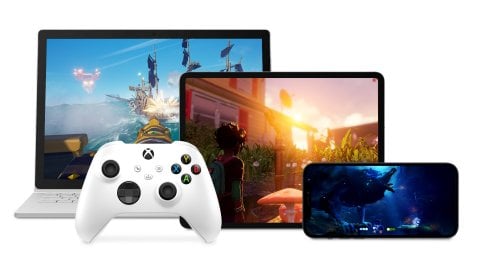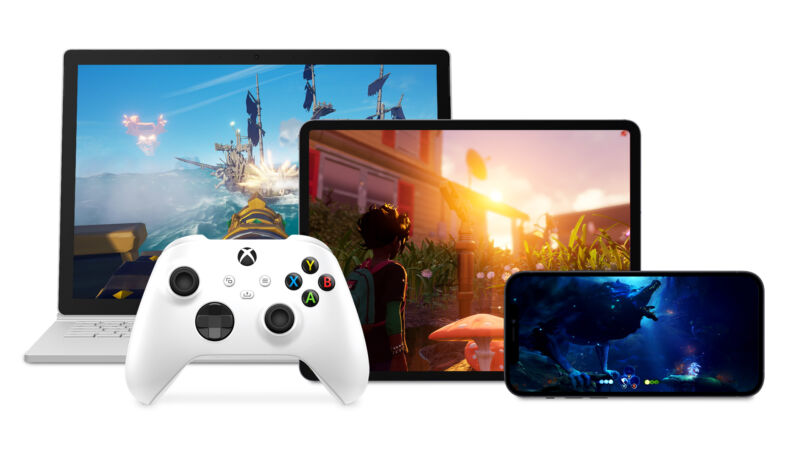
Xbox Game Pass
In a recent interview we had the opportunity to do with several Microsoft representatives, the Redmond giant confirmed its commitment to bring Xbox Game Pass directly to Smart TVs. In addition, devices should also be in the works to ensure that even non-smart televisions, such as slightly dated monitors or panels, can access Microsoft's streaming service.Xbox Game Pass is the pivot around which Microsoft bases its gaming strategies is now clear. Except that the colossus of Redmond by gradually revealing its strategy, without haste and trying to wait for the timing to mature. On the other hand, being Microsoft has advantages and among these there is the possibility of being able to wait without problems for a project to start generating revenue, without being afraid of reaching the end of the month.
For this reason , after launching the Xbox Game Pass, Phil Spencer's company waited for xCloud to come out of beta before officially integrating it into the service. Now is the time to take the next step, which is to use streaming gaming to expand beyond the PC and console markets.
Microsoft is working to expand the devices on which Xbox Game Pass arrives Archived Android and soon iOS, two rather simple ecosystems to integrate, now it's time to further expand the audience towards even less specialized players and systems. While there are no release dates, Microsoft has confirmed that it is already working with several hardware manufacturers to integrate Xbox Game Pass into Smart TVs. Samsung, also from this point of view, could be a privileged partner, as it is on mobile.
Microsoft, however, has also said that it is ready to take the next step, that is to create hardware devices (such as the Amazon Fire Stick and the Apple TV, we would say) with which to render Smart even monitors and TVs that do not have these capabilities, so as to make them gaming devices too. "Certain companies have erected barriers around players, locking them inside specific hardware," Microsoft said, a phrase that encapsulates the Redmond giant's strategy for the next few months.
Have you noticed any errors?
Xbox’s Game Pass-ified future: Streaming stick, TV app, Series X servers
 Enlarge / If you want to play Xbox Game Pass titles on a weaker device, you'll need to sync to the subscription service's cloud library—and Microsoft is bullish that people will do just that from here on out.
Enlarge / If you want to play Xbox Game Pass titles on a weaker device, you'll need to sync to the subscription service's cloud library—and Microsoft is bullish that people will do just that from here on out.Ahead of Xbox's next major game-reveal event, slated to air online this Sunday, the console-maker's leadership team hosted an hour-long press briefing about how its business has been doing alongside hints of what to expect beyond specific games. Though the presentation was the kind of ham-fisted, Xbox-biased stuff you'd expect from an internal production, it still included a few compelling reveals and statements—and I'm saving you an hour of your life by breaking them out from the rest of the Xbox-and-pony show, now that the embargo has lifted.
Most of the event's biggest announcements, unsurprisingly, revolve around the wildly successful Xbox Game Pass subscription service—and new ways to access its wealth of over 200 games, particularly via the Azure-powered cloud-gaming library (available as part of Game Pass Ultimate subscriptions). That's assuming your bandwidth and monthly caps are up to snuff, at least.
Microsoft's execs confirmed plans to roll out a smart TV app for Xbox cloud gaming, which will allow interested Game Pass subscribers to access Xbox's cloud-hosted games using nothing more than their Internet connection and a compatible gamepad. The presentation didn't confirm which 'global TV manufacturers' will support the app or whether these efforts would lead to more streamlined ways to install the service's TV-specific app on existing streaming sticks. (And we have no idea when those apps will roll out; MS didn't offer even a vague estimate like 'this year,' which means Google Stadia will likely beat Xbox on this TV-specific front.)
If your ideal TV winds up not being supported, at least you'll have another option: official 'streaming devices' made by Microsoft that will support Xbox cloud gaming. This news finally confirms an 'Xbox streaming stick' rumor that has been circling for three years at this point. When we first heard the rumblings, we wondered whether last year's 'next-gen' Xbox would be paired with a streaming-only stick. (Instead, we got the $500 Series X and $300 Series S, both designed for locally rendered games.) Yet Microsoft's phrasing is decidedly unclear: just one model of streaming stick? Multiple models? When might they launch? And while the devices in question are only described as meant for cloud gaming, might they additionally support Xbox consoles' media apps? We have no idea.
Browsers, better servers, and cloud on the consoleShould you be keen to run Xbox cloud gaming on your favorite device's web browser, that support will roll out 'in the next few weeks' on Chrome, Safari, and Edge. Yes, that includes mobile browsers. We don't yet know whether that implementation will suffer in either efficiency or fidelity compared to dedicated cloud-streaming apps, though if that's the case, we look forward to official cloud-gaming support on the Xbox app finally rolling out 'later this year.' (As in, not the wonky beta version I've already tested.)
AdvertisementIf you own an older Xbox, two pieces of news confirm that you'll, too, be primed to access Game Pass' best cloud offerings: official cloud-gaming integration within every Xbox One and Series X/S console by the end of the year, and an Azure-wide upgrade to every Xbox cloud instance, beefed up to Series X specs, by the end of June. The latter is huge news simply in terms of updating most Xbox cloud-gaming instances from the base Xbox One (not even Xbox One X!). That will beef up frame rates, shrink loading times, and add other next-gen processing perks to compatible games.
Combine those two pieces of news and Xbox could reach the proposition I had assumed would unfold eventually: a cloud-fueled way to neatly sunset older Xbox One consoles for higher-end games. Older and lower-spec games could continue to thrive on base Xbox One as local downloads and installs, while anybody eager to play the most demanding software could still technically access Series X versions on their ancient consoles. (Depending on the game, a latency hit via cloud streaming is arguably a better compromise than scaling virtual worlds down to the wimpy base Xbox One.)
Though nobody at the Xbox division hinted to such a scenario, Xbox peeps admit that a built-in cloud-gaming feature would let the company experiment with free, cloud-hosted trials of full retail games. That means that interested shoppers could try games before buying them outside the 'free with Game Pass' ecosystem. Google Stadia has been heavily criticized for not offering this very feature on its own streaming service.
“A new game every quarter”—and Game Pass as a first-party turning pointXbox Game Pass' supported cloud-gaming regions are about to grow, as well, with the service getting official server-farm support in Australia, Brazil, Mexico, and Japan 'later this year.' And Xbox has a few ideas for how to expand Game Pass even more in those regions, including regional variants of its Xbox All Access purchase plans and 'new subscription offerings' tailored to 'financial realities.' In other words: Xbox might roll out a cheaper monthly subscription cost for some regions, perhaps limited to a certain number of hours per month.
'Frankly, almost any new device category that is connected to the cloud' will soon be able to access Game Pass' library, Xbox head Phil Spencer says. Much of the presentation hinged on the idea that players can come to Xbox however they want—through high-end PCs and the top-end Series X, or lower-priced options—and expect a ton of free-to-play and Game Pass content. The way Microsoft tells it, the Game Pass formula is currently working, thanks in part to its buffet-style game selection (as opposed to Stadia's emphasis on a la carte purchases, which Spencer does not directly mention).
Advertisement“Our total addressable market is going to grow, while others are relatively static.”
As a result, Spencer uses Game Pass' success as a way to take indirect shots at competitors in both the console and mobile space (though the following quote sure seems targeted at Sony).
'We simply put more top quality games in front of more people than other companies,' Spencer says. 'Across the Xbox ecosystem, we're now reaching hundreds of millions of people every month. Our total addressable market is going to grow, while others are relatively static. As the Xbox ecosystem grows in both content and total size, it becomes more available to both players and our partners. Right now, we're the only platform shipping games on console, PC, and cloud simultaneously. Others bring console games to PC years later, not only making people buy their hardware up front but then charging them a second time to play on PC. Of course, all of our games are in our subscription service day one, with full cross-platform [support] included.'
Comparatively, Sony's PlayStation division isn't hurting in terms of sales and demand, but its own monthly subscription services, at least as of press time, fall well short of Game Pass perks like included first-party software. As PlayStation 5 consoles remain difficult to find, however, things could very well change on Sony's cloud-gaming front, should they introduce their own newly aggressive subscription option.
Once Game Pass players arrive, what content is Microsoft driving as a first-party publisher? We didn't get Halo Infinite last year—or, really, any big-ticket Xbox exclusives in the past 12 months. Without this Sunday's reveal details in hand, we're left wondering how many games to expect from Microsoft's recent studio-acquisition frenzy in the near future. And while Spencer and his team have listed various acquired companies as a show of future force, another exec suggests a surprisingly slow cadence of first-party output.'We want to get to a point of releasing a new game every quarter,' Xbox Game Studios head Matt Booty says. 'Games take up to 4-5 years to make, and the reality is, not every project we start will make it to launch.'
Arguably, the 24 studios that make up Xbox Game Studios should be able to release a single game per quarter, if Microsoft factors in a mix of blockbusters and smaller-scale projects. Meanwhile, Booty hasn't clarified whether he means a higher-profile game per quarter. Either way, it sure sounds like Microsoft is eager to shift away from the industry's classic 'emphasis on the holidays' approach (and maybe spare some developers the pains of crunch in the process). In a gaming universe where fans subscribe with an expectation of new content every month, as opposed to stocking up for holiday smash hits, that release strategy might pay off.
Microsoft certainly isn't being shy about such a shift, with Xbox CFO Tim Stuart being blunt: 'In terms of our overall financial profile, the growing importance of content and services revenue makes our business more consistent on an ongoing basis—and less dependent on individual hits or hardware SKUs. Now, don't get me wrong: console sales and hit games are extremely important. But as we move towards a device-agnostic, global gaming experience, we can start to look at long-term engagement as the real north star of our business, as opposed to driving one-time events.'